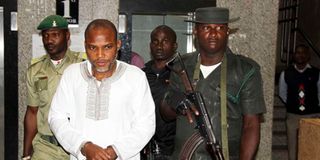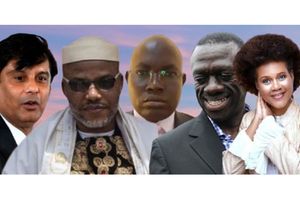
Nnamdi Kanu, the leader of a Biafra group that has been calling for secession.
The leader of a Nigerian group seeking the secession of the Biafra region has been awarded Sh10 million by the High Court in Nairobi as compensation for his abduction by police and deportation four years ago during President Uhuru Kenyatta’s tenure.
Justice Chacha Mwita said the Kenyan government violated Mr Nnamdi Kenny Okwu-Kanu’s rights and fundamental freedoms by allowing his arrest and forcible removal from the country.
"Having entered Kenya lawfully, he was subject to the protection offered by the Constitution of Kenya 2010 and the government of Kenya had an obligation to uphold and protect his rights and fundamental freedoms," said the judge as he ruled on a petition filed by Mr Kanu's brother Kingsley Kanu.
Charges of terrorism and incitement
Mr Kanu, a British-Nigerian citizen and the leader of a Biafra group that has been calling for self-determination, was arrested on June 19, 2021 at the Jomo Kenyatta International Airport (JKIA) where he had gone to pick someone.
He had flown to Kenya a month earlier on an East African Tourist visa from Kigali, Rwanda, and was living in Nairobi’s Kilimani.
He fled Nigeria in 2017 while on bail facing charges of terrorism and incitement. His escape to exile followed an attack by the military of the Federal Government of Nigerian that killed several members of the Biafra Party. His group has been calling for the secession of a part of south-eastern Nigeria.
According to court papers and Attorney General of the Federal Republic of Nigeria, Mr Kanu's arrest was effected through the collaborative efforts of Nigerian intelligence and other security services, such as Interpol, and the deportation to Abuja Nigeria was to allow him continue with a criminal case initiated in 2015.
In the petition filed at the Nairobi High Court, his brother argued that Mr Kanu was taken to Nigeria contrary to the procedure set out in the Extradition (Contiguous and Foreign Countries) Act.
This is because he was not shown a warrant of arrest, was not allowed to speak to his legal counsel, intermediary or family member. He was also not allowed to challenge the lawfulness of his detention and subsequent removal from Kenya and had never been classified as a prohibited immigrant in Kenya.
Abduction and incommunicado confinement
The petitioner asserted that there were concerns that Mr Kanu was being tortured while in detention in Nigeria given the history of being tortured by the Nigerian authorities thus, putting his life is in danger.
It was stated that Mr Kanu was kept in detention in Nairobi for eight days, was not allowed to bath and was fed on stale bread once a day and given non-sanitary water to drink. His plea to be given medications for hypertension and heart condition were ignored.
Justice Mwita noted that though the Ministry of Interior together with Director Immigration Services and Attorney-General maintained that the government of Kenya was not aware of the abduction and was not involved, they admitted there was no deportation order and that Mr Kanu exited Kenya through JKIA.

The leader of Indigenous Peoples of Biafra (IPOB) Nnamdi Kanu (centre) at the Federal High Court in Abuja on February 9, 2016.
The government had asked for dismissal of the petition arguing that the petitioner had not demonstrated that it was police officers who arrested Mr Kanu or that he was in custody of the Kenya authority. They said the petition was premised on hearsay.
However, Justice Mwita found that JKIA is a high security area and nothing could happen at the facility without being detected by the national security agencies. It was also not disputed that the Kenyan government was not responsible.
Further that there was no record at any police station showing that he had been lawfully arrested.
"The abduction and incommunicado confinement were not lawful acts and, therefore, there could be no record on acts not sanctioned by law given the respondents’ admission that there was no deportation order in respect of Mr Nnamdi Kanu. I find and hold Mr Nnamdi Kanu, having not left the country voluntarily, he was forcibly removed from Kenya and that is why there is no record regarding his departure or exit from Kenya," said the judge.
Torture and denial of food
On violation of rights, the judge said if, for any reason, Mr Kanu was to be arrested, the arrest had to be lawful. For instance, those arresting him had a constitutional duty to inform him the reason for the arrest and had to produce him in a court of law in Kenya within 24 hours following the arrest.
"The Constitution is clear that the Bill of Rights binds not only state organs, but every person within the territory of Kenya. In that regard, Mr Nnamdi Kanu’s rights were recognized and protected by our Bill of Rights. He had the right to enjoy those rights and fundamental freedoms to the greatest extent possible while in Kenya," he stated.
About the issue of who should be held liable for the violations, the judge said if the government's denial of the events surrounding the incident was to be believed, it would only show how perilous we stand as a country.
"That foreign agents can enter the country, conduct clandestine operations, abduct people who are lawfully in the country, hold them incommunicado, torture them and take them out of the country through some of the most secure national installations without the knowledge of the government and those responsible for the security of the country," he stated.
He held that it was implausible that Mr Kanu could have been abducted in broad daylight, held incommunicado in Kenya for eight days and subsequently put on a plane at JKIA and taken out of the country without the knowledge of the government and those in charge of the security of the country, including the Airport.
"This court cannot accept that such acts could take place in an independent and democratic state governed by the rule without the knowledge of those in government. It is my finding and, I so hold, that the covert operation to abduct and forcibly remove Mr Nnamdi Kanu from the territory of Kenya, was done with the Knowledge, connivance, complicity and tacit approval of not only the government of Kenya, but also those in charge of the security of the country," said Justice Mwita.
He found that the government was liable for the violations including the abduction, keeping of Mr Kanu in solitude confinement, torture and denial of food and medication, all of which the court declared amounted to a breach of basic rights.
"He was chained, humiliated, ridiculed and held in contempt and later forcibly removed from Kenya without following the law in violation of his rights and fundamental freedoms for which the government of Kenya is liable," stated Justice Mwita.
"An order for compensation is issued awarding Mr Nnamdi Kanu general damages of Sh10 million against the Attorney-General of Kenya on behalf of the government of Kenya for the violation of his constitutional rights and fundamental freedoms," ordered the judge. The government was also ordered to pay the petitioners costs incurred in the petition.








